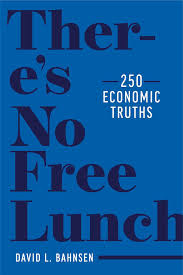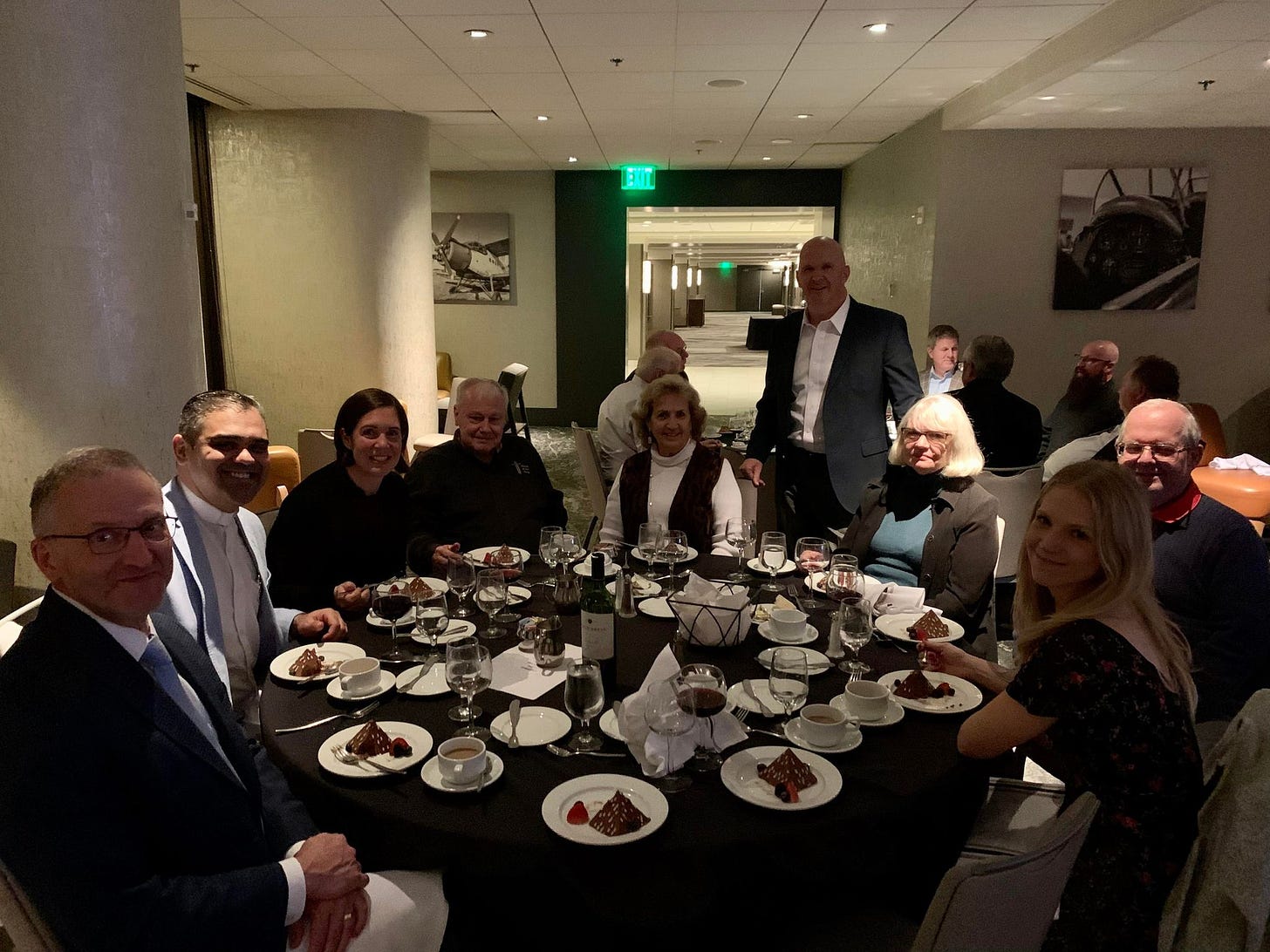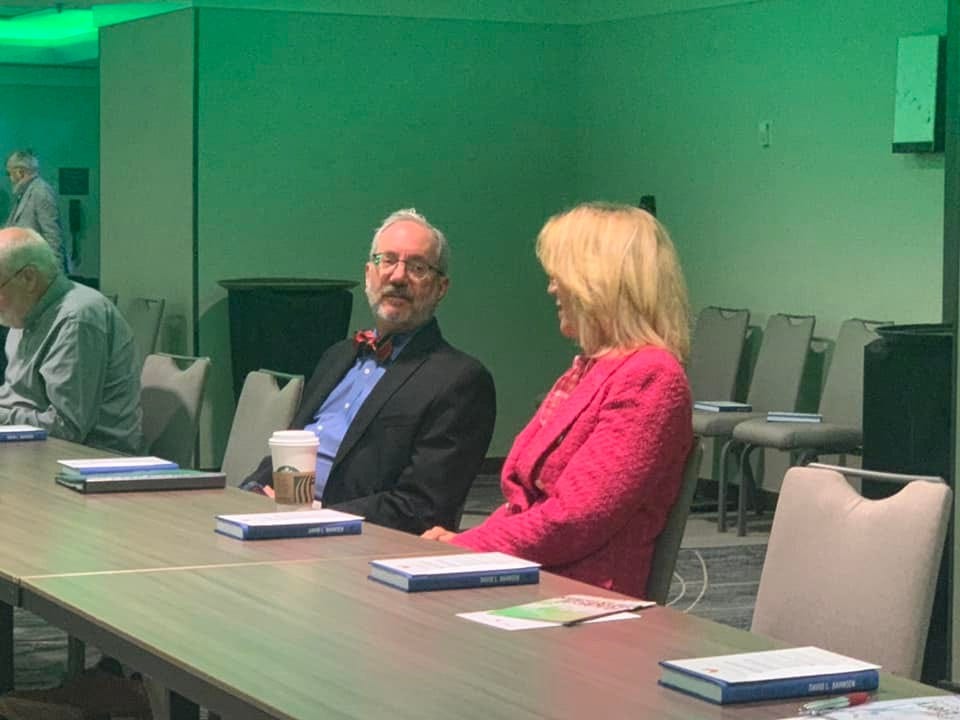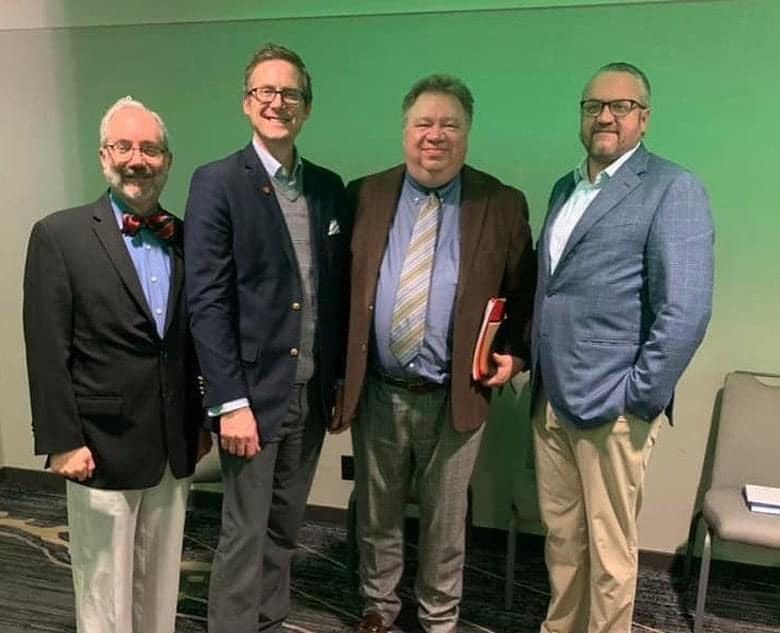Your Lunch Isn’t Free, But Markets Should Be
Ours is a time grown plump from the benefits of economic liberty and free markets while entertaining dangerous, superficial ideologies that threaten to kill the goose that lays the golden egg.
Dear friends and supporters:
For decades when asked what single book I’d recommend to explain basic economics, I always responded with Henry Hazlitt’s Economics in One Lesson. Anybody who has read this minor classic knows the first chapter is worth the price of the book. That chapter articulates the one lesson, consisting of two parts: when assessing any economic philosophy or policy, always consider (1) its long-term consequences, and not simply its short-term benefits, and (2) its impact on the wide population, and not just a single group of people. Consistently keeping this dual-pronged lesson in view will help prevent (or cure) a multitude of economic fallacies.
But after last month, my answer has changed. Hazlitt’s book will always remain invaluable, but now I must answer that the best single book on economic truth I’d recommend is David L. Bahnsen’s new There's No Free Lunch: 250 Economic Truths. This remarkable — and remarkably readable — book contains 250 short entrees subsumed under 22 categories touching every major aspect of modern economics. It communicates more economic truth in less space (without charts or graphs or jargon) than any such book I’ve read, and probably than has ever been written in recent memory.
Bahnsen, my dear friend of many years, is considered one of the leading financial advisors in the country and CCL’s Senior Fellow of Economics and Finance. He’s a committed economic conservative (what in a European context would be considered a classical liberal), and the great forte of his book is its succinctly tucking so many economic truisms into 300 plenty-of-white-space pages.
For example:
Human Flourishing and Liberty
Economic systems aren’t basically about charts or numbers, but about human life, and specifically about the kind of humans we should be. God created us in his image to be free beings (within the context of his moral law, of course), and that freedom should lead to flourishing, which is God’s design for us.
There’s one economic system and one alone that guarantees this liberty and the flourishing it creates, and that is known as capitalism, but better designated economic liberty or free markets. Economic liberty isn’t superior primarily because it creates more consumable stuff and creature comforts but, rather, because it permits individuals to be what God intended them to be, and incentivizes behavior that God intended them to display. Bahnsen:
The belief in man as a co-creator with God, the result of being made in His own image, drives me to believe that the human action a free enterprise system cultivates best honors his or her personhood and dignity. Out of the creative and free capacity of a humanity not living in servitude, has mankind done her best work.
Friendship and Markets
Bahnsen decapitates numerous straw men erected to counter economic liberty. One of the main arguments is that while this arrangement is almost universally acknowledged to produce vast wealth, it thrives on an adversarial, dehumanizing, dog-eat–dog competition. It turns people into rivals and enemies. Bahnsen knows better:
Rather than demonize business, we ought to embrace the social reality that community is enhanced by trade and commerce. To believe that we create fuller communities by denying them free exchange with one another is to assert the idiotic. In the context of commercial endeavors, true friendships can be born — not always, but certainly often. In the context of a commerce-free world, social alienation is assured.
The idea that business can and very often does create friendships or, at least, stable, cordial relationships is an indisputable fact, but one which many critics of markets seem to ignore.
Covetousness Kills
Bahnsen points out that at the root of much opposition to economic liberty is the sin of covetousness and the class envy it nourishes. The fact that this sin harms in two ways is often not recognized:
Covetousness not only carries the emotional gratification of resenting someone else, but it seeks to relieve one’s self of the burdens and responsibilities of action. For that reason, it is a double sin. It contains all the corrosive elements of disdaining others for their success while simultaneously preventing us from being our best selves.
Covetousness doesn’t just lead to flawed economic policies; it creates un-virtuous, self-defeating individuals.
The Profit of the Profit Motive
Bahnsen has a fascinating penchant for stating not just the obvious, but the obvious that seems to have eluded many of the critics of markets. From Karl Marx onward, critics have decried “the profit motive,” but why they limit this alleged vice to business owners mystifies. After all, each of us seeks profits when he gets up in the morning and walks into the kitchen to get breakfast. The employee wants profit when he goes to work. The parent desires profit when he purchases Christmas gifts for his children. For some reason, however, for a business owner to seek profit for his family (and, I might add, for his employees), he’s somehow venal. There’s nothing inherently wrong with profit-seeking, and in fact human life without the profit motive would be impossible.
The Wide Dispersion of Knowledge
Bahnsen puts his finger on the most important economic fact distinguishing free markets from political interventionism that is least realized or understood: the wide dispersion of knowledge. The chief reason centralized economic planning (like statism) is destined to fail is it cannot account for human decisions which are at the heart of basic economics.
Ordinary economics is the complexity of multi-trillions of ordinary decisions made globally every day by ordinary people. They make these decisions based on their own knowledge, worldview, and self-interest. They’re often not particularly interested in how other people will benefit from those economic decisions, but this isn’t principally because they’re callous about other people. Rather, it’s because they don’t assume they know what’s best for other people.
Politicized economic planners, however, those Thomas Sowell termed “the anointed,” and Angelo Codevilla called “the ruling class,” are confident they know best how society should be arranged, including how it should be economically arranged. In Sowell’s parlance, they’re “surrogate decision-makers.”
Bahnsen observes that this arrangement, which, if left unimpeded, degenerates into socialism, is always a failure everywhere it’s tried. It’s not only a debilitating moral failure, though it’s certainly that. It’s also an abysmal economic failure. Why? Simply because nobody has the knowledge capable of determining other people’s economic wants or needs. The smartest economists in the old Soviet Union couldn’t predict what the price of milk should be next Tuesday morning or how much employees should be paid at 5:00 p.m. Friday, simply because they couldn’t predict citizens’ (or employers’) economic decisions, which can never be fixed, but are always fluctuating, sometimes from one moment to the next.
Prices = Information
In fact, this is where prices come from. There’s nothing magical about prices. Prices are just readily accessible pieces of economic information about a particular product or service. The seller knows how much he wants, and the buyer knows how much he’s willing to pay for it. Because of subjective factors behind the thinking of both the buyer and seller are changing all the time, prices are constantly fluctuating. This is why some items that seem expensive in May are found on the clearance rack at the end of the August. In most cases, the product didn’t change; what changed was the subjective value at a given time.
The reason free markets are the best way of distributing goods and services isn’t just that they presuppose economic liberty. They’re simply the best means of price discovery. Prices tell us what something is worth at a specific time. And that worth is always subjective. It doesn’t matter if the haberdashery owner thinks the wingtips are worth $250 if no man will pay that price. Products (and services) are worth precisely what people are willing to pay for them.
The fundamental blunder of political interventionism is the arrogance of a few bright people to assume that they know better than buyers and sellers what prices should be.
Unavoidable Trade-Offs
It’s in discussing issues like free trade, credit and sound money, taxation, and the minimum wage that Bahnsen’s title “there’s no free lunch” comes to the fore. There’s no free lunch means: for every economic decision, there are economic effects not immediately apparent. For example, you can’t coercively interfere in the economy in benefitting one group of people without causing negative economic consequences for other groups. Trade-offs are unavoidable. In fact, the statement “trade-offs are unavoidable” is really the positive obverse of “there’s no free lunch.”
“Fair Trade”
Today even a majority of conservatives oppose free trade in favor of “fair trade,” sometimes called protectionism. In the strictest sense, this is a form of national socialism.1 Bahnsen points out that it’s wrong to say that duties and tariffs “protecting” jobs of an industry (like steel production) in one’s own country from subsidized competition by workers in other countries actually benefits a country. A tariff in one country always harms the purchasers in that country by keeping goods and services artificially high. In short, protectionism protects one class of citizens, and harms another class. There’s no free lunch. Somebody always pays.
Minimum Wage Laws
The same is true of minimum wage laws. They always “protect” current workers, or more highly skilled workers, but they harm potential or less-skilled or entry-level workers who won’t and can’t be hired because the employers are forced to pay higher wages; they’ll pay those wages to the more highly qualified employees. We sometimes hear that minimum wages are fair wages. The real question is: fair to whom? Not to the employees who can’t get a minimum wage — or any wage at all.
Politicized Interest Rates
And when the Fed keeps interest rates artificially low, that benefits borrowers — but injures investors. It helps mortgage loan applicants and harms the elderly on a fixed income.
Covid Checks
When politicians disburse direct-deposit Covid “relief” checks, they create money, but not wealth. More dollars chasing the same amount of goods and services devalues each dollar. There’s no free lunch. There are always trade-offs.
Moral Markets
One of the most important contributions of the book is to question the frequent defense of free markets (by libertarians, for instance) on the exclusive grounds of utility: economic liberty makes the best use of resources in meeting human needs. It does that, of course, Bahnsen asserts, but, more importantly, economic liberty is virtuous. It incentivizes and nourishes the kind of people we should be. It demands personal responsibility, care for the wishes of others, fair play, the rule of law, honesty and integrity.
Of course, free markets can be and are abused. This is just another way of saying that human liberty can be abused. And while God’s moral law demands the suppression of theft, extortion, and fraud in the marketplace, political intervention to make economic results “more just” is really an attempt to replace one of abuse of liberty with another. While the greedy and covetousness abuse economic liberty to multiply consumption for their own lusts, that problem isn’t solved by vesting politicians with the authority to multiply power for their own lusts. The greed and covetous problem will never be solved this side of eternity, since man in sinful, but it can be mitigated by virtuous individuals and institutions:
Big government is as big as self-government is lacking. This axiomatic truth is at the heart of the relationship between the citizen and the state. Mediating institutions, the family having the most leverage of them all, serve as the effective administrators of self-government, sacrifice, cooperation, and constraint. The incentives are aligned. Civilization is a testimony to the relative success of the institution of family in generating constraint and the failure of the state in doing so.
Moral markets are undergirded by virtuous families (and churches, and friendships, and other prepolitical actors).
Conclusion
Don’t assume I should’ve added a spoiler alert at the beginning of this review. This book contains so many economic truisms that I’ve barely skimmed the surface. Get the book, and you’ll see what I’m talking about.
Ours is a time that has grown plump from the benefits of economic liberty and free markets while entertaining dangerous, superficial ideologies that threaten to kill the goose that lays the golden egg. Likely the vast majority of teenagers and young adults in the West are being taught that free markets are unjust, greedy, racist, sexist, and venal. Nothing could be further from the truth. The lush economic fruits of Western civilization hang from the tree of human liberty rooted in Christian virtue. Without that virtue, the tree will eventually shrivel and the fruit die.
If this book educates an upcoming generation of not only the unprecedented fruits our civilization enjoys, but why those fruits require and produce virtue, it will provide an incalculable service to the preservation of one leading factor that made our civilization great: virtuous liberty.
Will you consider a tax-deductible donation to CCL via PayPal or Venmo? Or mail a check to CCL, Box 100, Coulterville, CA 95311. God uses you to keep us going — and expanding.
Personal
It was great to see many of you at the symposium in San Francisco. It was by every measurable metric the best in our 21-year history, an undisputed answer to prayer (photos below).
I hope that many who have never before attended one of our symposia can meet with us next year. The theme will be the family. I’ll announce the date and send more information later. In addition, we’re contemplating a big two-day 25th anniversary conference in the fall of 2026. Please pray with me about this.
Next week I hope to write on “The Bethlehem Baby is the Real God.”
May God grant you the most memorable and joyous Christmas ever with your family and friends.
In Christ the incarnate King,
Founder & President, Center for Cultural Leadership
The Theory Behind CRT
Want to to learn where Critical Race Theory came from? Watch this interview:
Birthday of the King
Here’s a great stocking stuffer:
Christmas heralds the world-conquering Gospel of Jesus Christ that re-orients all things. This book discloses aspects of that vital herald: "Why Celebrate Christmas?", "Jesus as the the Counter-Logos," Christian Universalism: Is Jesus Really the Savior of the World?", Christmas as a Christian Holy Day and Why Secularists Have Successfully Attacked It," and more.
Get the book here.
More great stuff:
The Center for Cultural Leadership site is here.
My Amazon author page (print and digital) is here.
You can find my sermons and lectures at my YouTube channel.
Sign up to get my blog updates here.
Here’s my Twitter feed.
If you want to get the free exclusive hard copy publication Christian Culture, please send me a Facebook private message.
The CCL phone number is 831-420-7230.
The mailing address is:
Center for Cultural Leadership
P. O. Box 100
Coulterville, CA 95311
By this I’m not suggesting protectionists are Nazis or racists. I’m noting that they believe in socialism practiced by nations in relation to other nations. It’s OK to pilfer from one group of citizens in one’s nation to reward another group as long as the pilfering is in retaliation for businesses in other nations.










